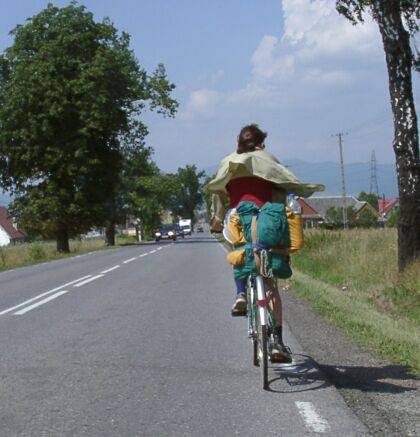
Agnieszka

Agnieszka
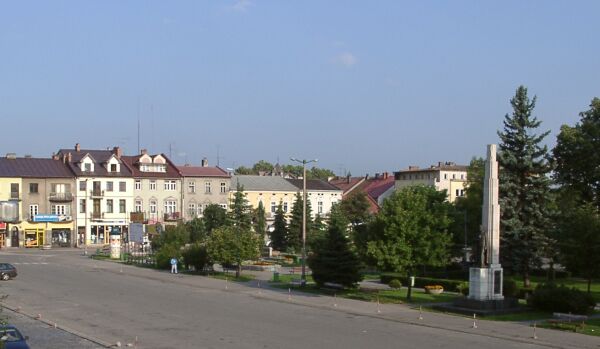
Part of the town square in Nowy Targ

Climbing the hill north of Nowy Targ
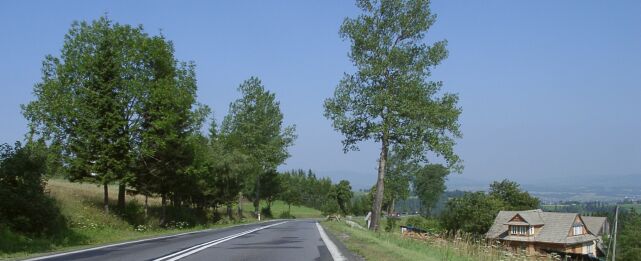
At the top
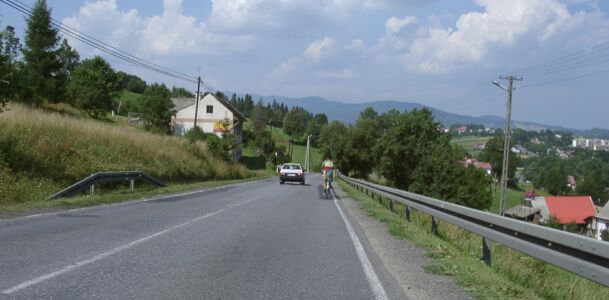
Agnieszka, riding ahead of me downhill
I was surprised when I saw that her bike had a narrow range 4 speed freewheel and only one front ring. We were in quite hilly country and, as it turned out, she was effectively riding a bike with a single gear. I also discovered that her bike's crank bearing was very loose and, a little later when I was riding behind her, that its rear tire was worn out. She had ridden from Krakow to Nowy Targ and was now riding back to her home in a village some 200 km away. She had had a companion on the ride, but he had lost her - probably while she was walking up a long hill(!) - and she was having serious mechanical problem.
I couldn't fix her loose BB, but I told her it wasn't dangerous - it was no looser than the one on Ralf's bike ( the German fellow I rode with in Austria and Italy). I rode on, but when I needed to stop to take a break and check my computer map, I waited for her to catch up and asked her if I could try to make her shifting work better. I did, and in the process discovered that her freewheel was shot. I was able to get it to work, but the treads on the outer ring were stripped and the tabs that keep the cogs from rotating were stripped on some of the other cogs. There was no way that bike was going to make it to her village, so I suggested that I would ride with her and we should find a bike shop. Her route, through Oswiecim, was the same as mine. She asked some pedestrians in the next village and they said they thought there were bike shops in a town, Jordanów, that was on our route. We rode on as I rode behind her and kept an eye on her rear tire and freewheel, hoping that they would make it.
We made it, with some walking up a hill, found a bikeshop, were redirected to another owned by the same family, and found a very nice fellow who worked on the bike, fixing the BB, truing the rear wheel, and replacing the tire. We went to lunch while he worked, and got to know each other better. It started to rain while we were eating, but stopped about the time we needed to get back to the bike shop. When we got the bike, we discovered that the freewheel problem was worse, so we asked the owner of the shop to put a wide range 5 speed freewheel, a new derailleur that would work with it, and a new chain. When the bike was ready to go, it was raining again. We waited a little while, but we had 70 km to go to Oswiecim and it was mid afternoon, so we rode on in the rain. What a ride it turned out to be!
With her strong legs and the wide range freewheel, Agnieszka had no more problems with hills. We were riding through thunderstorms so the rain was often heavy and the puddles were deep and her rain gear consisted of a wide brimmed hat! Still, she was having a good time, flying down the road dodging puddles and a few potholes, and I was working hard to just keep up with her. She did stop when we got to a town that had a railroad station and suggested we could take the train from there, but both of us were enjoying the ride in the rain, so we rode on. After about 40 km we were out of the rain and we stopped so I could take off my rain cape and eat. She said she wasn't hungry, but I shared my bread and cheese with her. Then we rode on to Oswiecim, stopping once more to snack and once for her to refill her waterbottle from my water supply. I have never ridden with anyone else whose way of riding, pace, and general attitude towards touring fit so well with my own. It was, despite the rain and often heavy traffic, a great ride.
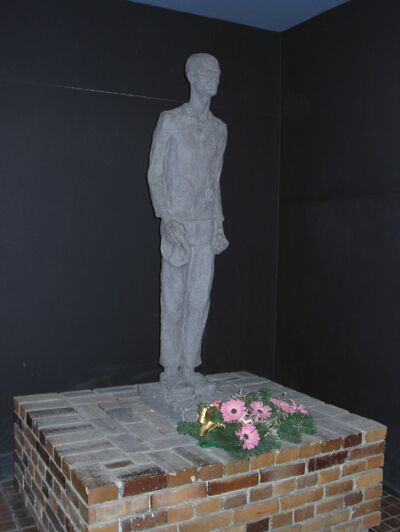
A powerful symbol of Polish Resistance
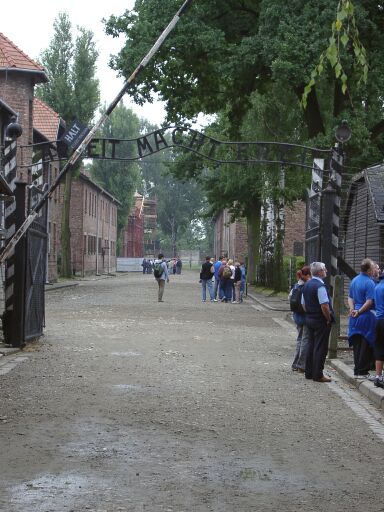
The infamous entrance to Auschwitz
But look at how pretty this place where genocide took place now is!
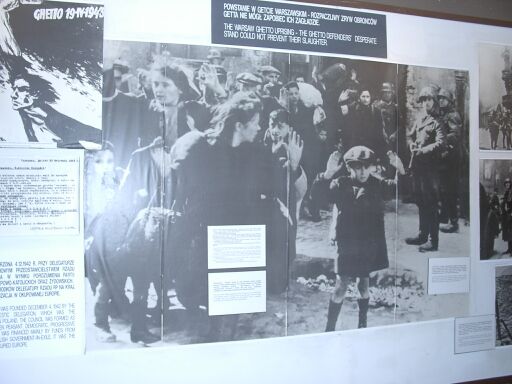
Part of the exhibit on the Warsaw Uprising
The textual information is in Polish
and English.
Hebrew text is also supplied for some of the exhibits
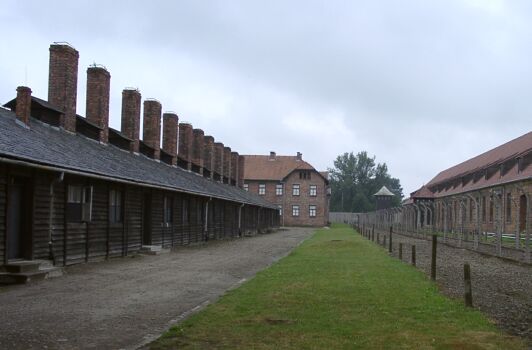
Crematoria on the left, the electrifed fence that many people committed suicide on on the right
The exhibits are good, but have an antisemitic feel about them. The emphasis, as at Mathausen in Austria, is on the suffering of the people of the country - 'Ethnic Poles' in this case - under Nazi rule. Ethnic Poles certainly did suffer, and die in very large numbers, at Auschwitz, but they were not treated as harshly as Jews were nor were they killed in as large a number. I don't know what percentage of ethnic Poles were killed, but I know it is much smaller than the 90% of the Jews in Poland when Hitler invaded who were murdered. Interestingly, in the exhibits I saw, the Roma people, who were persecuted just a harshly as the Jews, although in much smaller numbers, are given a much more sympathetic treatment than Jews.
The exhibit on Polish behavior during the war was, although biased, very good and I, although I knew the Poles were major victims of Hilter's racism, now have a much better appreciation for both their struggle against the Nazi's and their suffering during that occupation. I also have a better feel for their current antisemitism.
The most upsetting exhibit I saw combined the Warsaw Ghetto Uprising and the the, later, Warsaw Uprising. Unless you read the presentation closely, it seemed like it was only ethnic Poles were really involved in 'the uprising.' There was a statistic which reflected the bias of that presentation: it went something like 'Of the 320,000 people who died in Warsaw Uprising, 150,000 were Ethnic Poles. The majority were not 'Ethnic Poles,' so, they weren't specifically mentioned. Russian behavior during the Warsaw Uprising also got very harsh treatment, probably reflecting the residue of Russia's long occupation of Poland after the war. That occupation seems also to be the source of much of the antisemitic feelings in Poland today.
Agnieszka and I had talked about antisemitism in Poland and she said that it was a result of the Soviet occupation. Many of the Jews who came back to Poland after the war were communist and many worked with the Russian, so all Jews were regarded as collaborators with the occupiers. Before the Russians left, there was a wave of antisemitism (in 1968) which drove almost all of the remaining Jews out of Poland. Agnieszka had never met a Jew and had heard her uncle make antisemitic remarks, but she was not upset when I told her I was a Jew.
After Visiting Auschwitz, we rode to the train station planning for Agnieszka to take the train to a town 20 km from her village and for me to take the train to Prague or Dresden. At the train station, Agnieszka invited me to come home with her and meet her family! I was delighted to do that, so we took a train to Katowice and then another train to Tarnowskie Góry. Riding Polish trains with a bike was easy, except for the up and down stairways between tracks. Some trains have a car with a room (no racks) for bikes and such, but with or without that car, you can just find a place for your bike in the regular cars if the train isn't full of people. Nice. On the other hand, these trains are even slower than the local trains in Germany! Of course they are also much cheaper.
When we rode out of Tarnowskie Góry, I expected a to ride to a village near a major road. but Agnieszka's village, Mikoleska, is 7 km back into a forest. It has 30 residents in about half a dozen - I didn't count them - houses. The road in is paved, but bumpy, and it does have a few potholes.
I wondered how Agnieszka's parents would react to her bringing home a strange man three times her age. The reacted very graciously. After hearing what had happened they thanked me for helping her and were upset with her for getting into a bad situation. I pointed out that her friend got her into that situation and she had handled it well. Her friend has not called her parents, so they insisted that she call him. He is a strong rider and had been home for quite a while, but hadn't contacted them. He said his father had tried to call them. Agnieszka wasn't very upset with him, but her parents, justifiably, were.
I spent the evening eating and visiting with Agnieszka's family, and slept well in their son's room. From Agnieszka and from her parents - with Agnieszka translating - I learned a great deal about Poland, its history, and it's current problems. I also now have a much better feel for this country and new friends to come back and visit. My meeting with Agnieszka and her family has been one of the nicest experiences touring that I have every had. I got to pass on a little bit of the help many kind people have given me over the years, I got to experience Poland in a much more intimate way than I would have without them, and I got to know Agnieszka and her family who I expect will be my friends for many years. Her family has invited me to come back to visit them and I hope Agnieszka and I will get to tour together next year as part of my next summer tour. Poland, which was a place I didn't think I'd enjoy very much, was one of the best parts of this tour. I will be back.

Agnieszka's family in front of their home